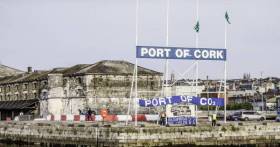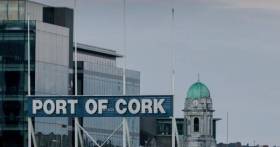Displaying items by tag: Port of Cork 'Sign'
Campaigners Extinction Rebellion Targets Port of Cork Demanding Action on Climate Change
Campaigners for the environment, Extinction Rebellion have targeted the Port of Cork in their latest protest.
According to EchoLive.ie, signs emblazoned with slogans such as "Port of CO2" and "Business as Usual??" were attached to the Port of Cork sign at Custom House Quay.
The group said the action was carried out in a non-violent and non-destructive way.
Extinction Rebellion is an environmental movement aiming to draw public and government attention to the need to tackle climate change.
In April and July, the group staged ‘die-in’ protests, on Oliver Plunkett Street and outside City Hall, where participants symbolically played dead to mimic an apocalypse.
The protest group is adamant that radical action must be taken to immediately halt biodiversity loss and reduce greenhouse gas emissions to net zero by 2030.
Click here for more on the story.
At the entrance to Cork city is the iconic Port of Cork sign which should be retained when the site is redeveloped the Green Party has said.
A planning application, reports EchoLive.ie, has been lodged for Ireland's tallest building located at the Port of Cork buildings at Custom House Quay.
Tower Holdings are proposing a 34-storey skyscraper hotel that would reach approximately 140m in height.
If approved and constructed, it would become Ireland’s tallest building by a significant margin, outstripping the current tallest building, the 79m-high Capital Dock in Dublin.
The €140m project will also include retail units, cultural spaces, food and beverage businesses, office space, recreational areas, and a micro-distillery, which the developer says could create up to 800 jobs.
Below the hotel, the Bonded Warehouses will be occupied by a range of uses to complement the hotel including retail, restaurants, cafes, and gallery and cultural spaces, with a public promenade wrapping around the entire site.
The proposed distillery would be located at the tip of the site where both the north and south channels of the river Lee meet.
More on this story here.






























































